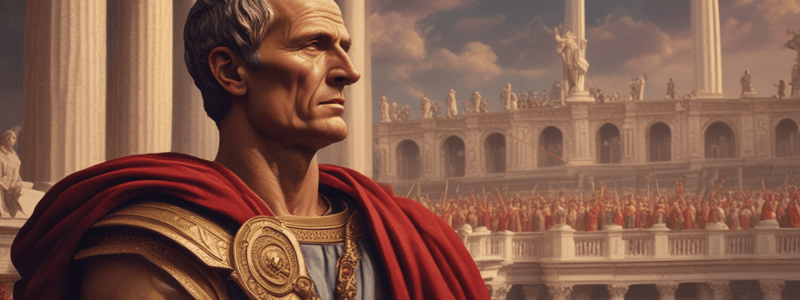Podcast
Questions and Answers
Caesar's conquests expanded Roman territory, spreading Roman culture and Latin language across ______
Caesar's conquests expanded Roman territory, spreading Roman culture and Latin language across ______
Europe
The political changes implemented by Caesar included centralized authority and the concentration of power in the hands of a single ______
The political changes implemented by Caesar included centralized authority and the concentration of power in the hands of a single ______
ruler
Caesar's political career highlights the complexities of leadership, including the interplay between ambition, charisma, manipulation, and the pursuit of ______
Caesar's political career highlights the complexities of leadership, including the interplay between ambition, charisma, manipulation, and the pursuit of ______
power
Students can learn valuable lessons about the challenges and responsibilities of political leadership from studying Caesar's rise to power and his eventual ______
Students can learn valuable lessons about the challenges and responsibilities of political leadership from studying Caesar's rise to power and his eventual ______
Many of the political issues and dynamics that characterized Caesar's era, such as populism, authoritarianism, civil unrest, and the struggle for ______, remain relevant in contemporary politics
Many of the political issues and dynamics that characterized Caesar's era, such as populism, authoritarianism, civil unrest, and the struggle for ______, remain relevant in contemporary politics
By studying Caesar's politics, students can gain insights into enduring political themes and dilemmas that continue to shape ______ today
By studying Caesar's politics, students can gain insights into enduring political themes and dilemmas that continue to shape ______ today
Julius Caesar was a Roman statesman, general, and eventual dictator who played a significant role in the downfall of the Roman Republic and the rise of the ______.
Julius Caesar was a Roman statesman, general, and eventual dictator who played a significant role in the downfall of the Roman Republic and the rise of the ______.
Caesar was born in 100 BCE and rose to prominence through his military conquests, particularly in Gaul (modern-day ______).
Caesar was born in 100 BCE and rose to prominence through his military conquests, particularly in Gaul (modern-day ______).
Caesar's political career was marked by his populist policies, his ambitious reforms, and his skillful manipulation of political ______.
Caesar's political career was marked by his populist policies, his ambitious reforms, and his skillful manipulation of political ______.
He formed the First Triumvirate with Pompey and Crassus, which allowed him to consolidate power in ______.
He formed the First Triumvirate with Pompey and Crassus, which allowed him to consolidate power in ______.
Tensions within the Triumvirate eventually led to civil war, resulting in Caesar's victory and his appointment as dictator perpetuo (dictator in ______) in 44 BCE.
Tensions within the Triumvirate eventually led to civil war, resulting in Caesar's victory and his appointment as dictator perpetuo (dictator in ______) in 44 BCE.
Caesar's assassination on the Ides of March (March 15), 44 BCE, led to further political upheaval in ______.
Caesar's assassination on the Ides of March (March 15), 44 BCE, led to further political upheaval in ______.
Julius Caesar was born in ______ BCE
Julius Caesar was born in ______ BCE
Caesar's assassination took place on the Ides of March, which is on ______ 15th
Caesar's assassination took place on the Ides of March, which is on ______ 15th
The transition from the Roman Republic to the Roman Empire was marked by Caesar's appointment as dictator ______
The transition from the Roman Republic to the Roman Empire was marked by Caesar's appointment as dictator ______
Caesar's rise to power led to the establishment of the Roman ______
Caesar's rise to power led to the establishment of the Roman ______
Caesar's political career was characterized by his populist policies, ambitious reforms, and skillful manipulation of political ______
Caesar's political career was characterized by his populist policies, ambitious reforms, and skillful manipulation of political ______
The First Triumvirate formed by Caesar included Pompey and ______
The First Triumvirate formed by Caesar included Pompey and ______
Caesar's conquests expanded Roman territory, spreading Roman culture and Latin language across ______
Caesar's conquests expanded Roman territory, spreading Roman culture and Latin language across ______
The political changes implemented by Caesar included centralized authority and the concentration of power in the hands of a single ______
The political changes implemented by Caesar included centralized authority and the concentration of power in the hands of a single ______
Tensions within the Triumvirate eventually led to civil war, resulting in Caesar's victory and his appointment as dictator perpetuo (dictator in ______) in 44 BCE.
Tensions within the Triumvirate eventually led to civil war, resulting in Caesar's victory and his appointment as dictator perpetuo (dictator in ______) in 44 BCE.
Many of the political issues and dynamics that characterized Caesar's era, such as populism, authoritarianism, civil unrest, and the struggle for ______, remain relevant in contemporary politics
Many of the political issues and dynamics that characterized Caesar's era, such as populism, authoritarianism, civil unrest, and the struggle for ______, remain relevant in contemporary politics
Julius Caesar was a Roman statesman, general, and eventual dictator who played a significant role in the downfall of the Roman Republic and the rise of the ______.
Julius Caesar was a Roman statesman, general, and eventual dictator who played a significant role in the downfall of the Roman Republic and the rise of the ______.
He formed the First Triumvirate with Pompey and Crassus, which allowed him to consolidate power in ______.
He formed the First Triumvirate with Pompey and Crassus, which allowed him to consolidate power in ______.
Flashcards are hidden until you start studying




